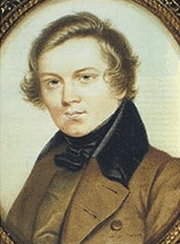On this date in 1810, Robert Schumann was born in Germany. His father was a bookseller and encouraged young Robert to read the humanistic works of Goethe and Byron. Schumann gave up Christian beliefs as a student. Schumann was educated at Leipzig and Heidelberg universities for a law career. Unable to resist the siren call of music, he first trained to be a pianist, then threw himself into composition.
He founded the publication Neue Zeitscrift fur Musik in 1834, which he edited for 10 years, an influential contribution to the promotion of progressive thought on music. His famous “Scenes from Childhood” was composed in 1838.
He married his beloved Clara Wieck, a talented concert pianist, in 1840. During his wedding year he composed 150 songs, many based on Romantic tales. In 1841 he turned to orchestral music, in 1842 to chamber music and in 1843 to choral music, including secular oratorio and Goethe’s “Faust.”
His lieder set to music words by such freethinking writers as Goethe, Heine and Kerner. Schumann had a devastating nervous breakdown, attended by hallucinations and suicidal impulses, in 1854. Although tended by Clara and his young protege and friend Johannes Brahms, Schumann did not recover, and died in a sanitarium two years later. (D. 1856)


